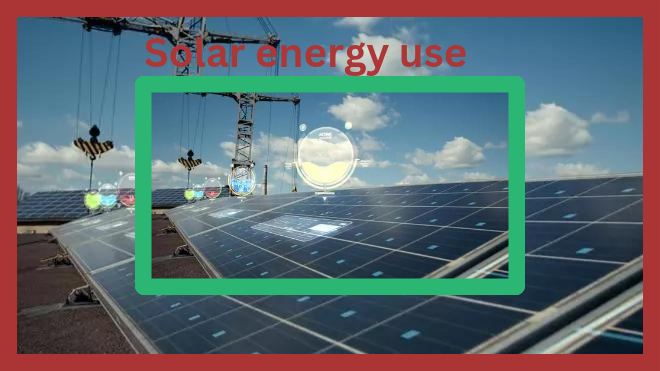
Solar energy is used in various ways:
- Electricity generation: Solar panels (photovoltaic cells) convert sunlight directly into electricity. These panels are commonly installed on rooftops or in large solar farms.
- Heating: Solar thermal systems use sunlight to heat water or air for residential, commercial, or industrial use. This can include solar water heaters or solar air heaters.
- Cooking: Solar cookers concentrate sunlight for cooking food, often used in areas where access to traditional fuel sources is limited.
- Desalination: Solar energy can power desalination plants, converting seawater into freshwater by evaporating and condensing the water using solar heat.
- Agriculture: Solar energy can be used in agriculture for tasks such as drying crops or powering irrigation systems.
- Transportation: Solar-powered vehicles, including cars, boats, and even planes, use photovoltaic cells to generate electricity for propulsion.
- Space applications: Satellites and space probes often use solar panels to generate electricity from sunlight in space.
Overall, solar energy is versatile and can be harnessed in many ways to provide renewable power for various needs.
Solar energy is increasingly being used for commercial purposes due to its numerous advantages:
- Cost Savings: Businesses can significantly reduce their electricity bills by generating their own solar power.
- Environmental Benefits: Solar energy is clean and renewable, helping businesses reduce their carbon footprint and meet sustainability goals.
- Reliability: Solar panels have become more efficient and reliable, providing a stable source of energy.
- Long-term Investment: Installing solar panels can be seen as a long-term investment, with potential returns as energy prices rise.
- Government Incentives: Many governments offer incentives, tax credits, and rebates for businesses that invest in solar energy.
- Energy Independence: Businesses can gain more control over their energy supply and hedge against future energy price fluctuations.
Commercial uses of solar energy range from small-scale installations on individual buildings to large-scale solar farms that feed into the grid. Industries such as retail, manufacturing, agriculture, and hospitality are increasingly adopting solar energy to improve their bottom line and sustainability efforts.